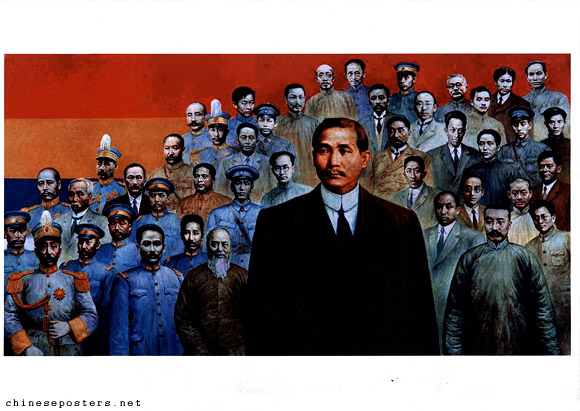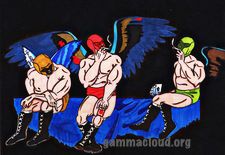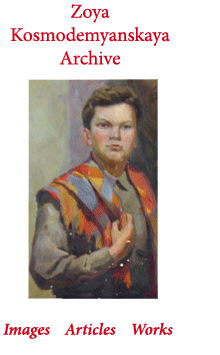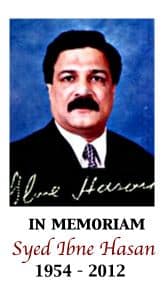Originally posted to greeklish.org in July 2008. Revised in 2022 for re-posting to this site.
Many people who are just the least bit acquainted with the history of modern China understand Dr. Sun Yat-sen to be one of the most important figures in the history of the republic. But it’s easy – or perhaps convenient for some – to forget that Sun based his revolutionary work on the principles of socialism as he understood it. In his 1956 article “In Commemoration of Dr. Sun Yat-sen,” Mao Zedong hailed Sun Yat-sen as China’s “great revolutionary forerunner,” touching on Sun’s integral role in the overthrow of China’s monarchy and the founding of the republic.
The 1916 work The Socialism of To-day is a fascinating guide to the socialism around the world on the eve of the Russian Revolution. It is important to note that the book’s survey of world socialist movements is not limited to the American and European experiences, as the people of the Intercollegiate Socialist Society had the foresight to include information regarding the situation in China. Of course, in the decades following China’s Revolution of 1911, the Chinese people would, time and again, remain steadfast in their commitment to overthrow the monarchy and drive the colonialists from the country and it was under the leadership of Dr. Sun Yat-sen, that their efforts began to bear fruit.
To Socialism of To-day features an interview with Sun Yat-sen from October 1913 during his exile in Japan. In this interview, he shares a terse analysis of the political, social and economic issues of the time and shares his insight on the importance of socialism as it relates to China’s future as an independent and developing republic.
Reproduced below are pages 358 through 360 of The Socialism of To-day in their entirety. This text has been reproduced in accordance with Fair Use provisions.
II. AN INTERVIEW WITH SUN YAT SEN
By Kannibelle in Japan, October 9, 1913
(Published in The New York Call, June 28, 1914)
[Dr. Sun, the first President of China, is regarded by himself and many others as a Socialist. His position is similar in many points to that of the Australian Labor Party or the Russian Labor group.]
”A political revolution is a necessary initial step toward an economic and industrial revolution…In constitutional countries the revolution will be attained through education and evolution; these are bloodless revolutions.
”The trouble in China is economic. It is between the landless, starving millions and the landed interests, who for fear of the ire of the people, have thrown themselves into the arms of the foreign capitalists. But after the establishment of a constitution and the overthrow of Yuan; Shi Kai, the newest revolution, however, needs no blood…
“Some people have construed this secondary revolution as the inauguration of Socialism.
“Socialism in China is known as Shay kwei choo yee which in English means ‘the theory of humanitarianism.’
This policy, which defied the usurped authority of Yuan Shi Kai, is the policy of the southern patriots, who aim at equality, universal love, and peace. This policy demands mutual aid, the abolition of the old ‘class’ system, and pledges itself to guarantee the abolition of poverty as well as extreme wealth….
“Therefore, Socialism is the only method of serving our politico-economic problems.
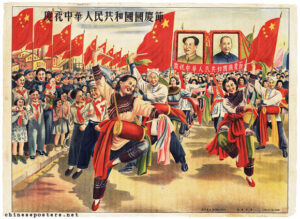
“Celebrate the People’s Republic’s National Day,” 1950; from the collection of Stefan R. Landsberger
“I know that industrialism is necessary in China; the march of civilization is too insistent to be stayed, and it must come to China. We must develop our resources, and the development of them provides food for serious thought. I want to avoid what seems to be the natural corollary of advanced modern capitalism–the unfair treatment of the toiler. And when I look around me for a solution I find none has yet been found by foreign countries.
“In our virgin country there is opportunity to begin rightly, and I am convinced that we should strive in every way so to meet the advance of industrialism that the worst features of it should be prevented from ever taking root. Therefore, I advocate Socialism. And what do I mean by that? I shall work in the future, as I have been working in the past, for the introduction of a system whereby the creators of wealth, the labor, will be able to receive its fair share of the production, and this must be based upon a common ground of justice and fraternity. By this system production would be enhanced and increased to the maximum, with a minimum of poverty and labor slavery. All men would have their proportion of the products of the wealth now awaiting development at their hands; they would reap the full fruit of their toil, secure favorable conditions of labor, and obtain opportunity in leisure to think of other things than the daily grind in the mill or the mine. They would be able to cultivate the mind, have adequate recreation, and procure the blessings which should be in all men’s lives, but which, on the showing of other nations, are largely denied the workers and the poorer masses.
“A chance would be given to all in the race for a livelihood in life, and the fullest measure of liberty should be provided. This is what I will fight to establish in China.
“When I urge Socialism, or a Socialistic system of government, I urge a system which will create for the people of China a direct interest in the vital affairs of their whole country; consequently it will create a more virile and worthy patriotism. I want to see the great multitudes of my country participate in the results of the productiveness of the country that is their own, and this is what I mean by nationalism.
”I also want to see that the state derives the fullest value from the sources of revenue which should be under its immediate control. I advocate state ownership of railways, tramways, electric light power, gasworks, canals, and forests. I want to see royalties coming to the state from mines and revenues from the land.
“The revenue derived from all these avenues will constitute a sum greatly in excess of what will be needed for state administration, and the balance may be used in tin necessary work of education and the more charitable and desirable objects, such as the old-age pension, the care of the lame and the blind.”
“The Kuo Mang Tang, the Nationalist Party in China, is in charge of these various political principles; its success or failure depends upon its members. It is powerful throughout the entire country, especially in the east and in the south. Its influence is extensive and is rich in resources. Numerous publications, banks, and other great industrial associations are supporting this party. Almost all the merchants who consider themselves enlightened are its members.
“From America it derives its greatest moral and mental weapons. From America the student class brings liberal and enlightened economic and political ideas, while from his curio shop or from his laundry the Chinese Nationalist forwards his voluntary contribution for the enhancement of this ‘theory of humanitarianism.’
“Thirteen out of 22 provincial governors are its members. Thirteen or more local legislatures are therefore under its control…Out of a total of 880 members in the new Parliament, 446 are Nationalists, while the political unionists, the Yuan Shi Kai partisans, number 120; the rest are Republicans, under Li Yuan Hung; the Democrats, under Kang Liang, and the Independents. The Yuan Shi Kai régime at first tried to unite his faction with the rest of the factions in opposition to the Nationalist Party. Those he could not persuade he bought over, while he succeeded in exterminating many members of the Nationalist Party in the Parliament until he attained the necessary majority to perpetuate himself in power.
“These are the facts regarding the rebellion of the South and the East. No, there will never be true peace and tranquility in China until the country’s politico-economic problems are solved ‘by and through selective judgment of the people of China.
“My country is awakening and is awakening fast for one which has been in a stupor for many centuries. She will soon take her place and demand respect among the greatest nations of the world. Yuan Shi Kai may retard her progress, but he cannot thwart her steady advance indefinitely.”


